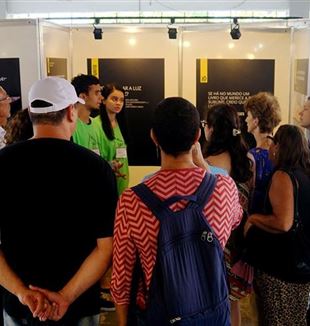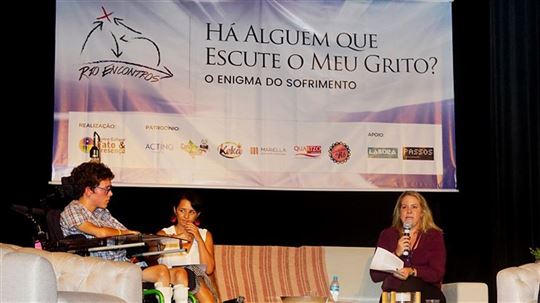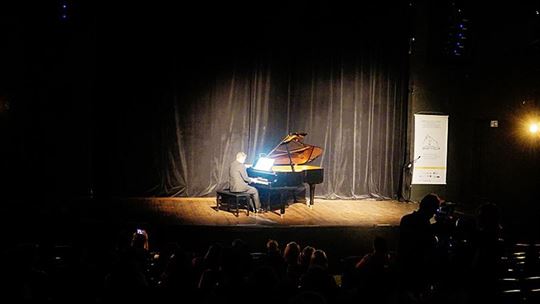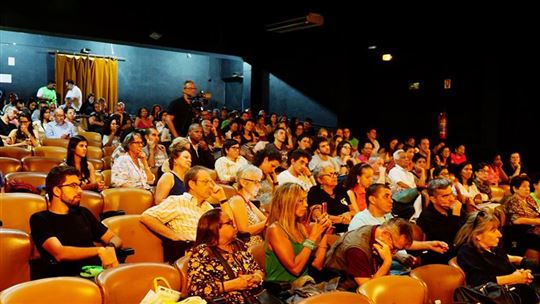
Brazil: Who has begotten the drops of dew?
Young Francisco Cantero Burroni in a wheelchair, a Bishop from the Amazon and those who assist victims of violence and the guilty. A chronicle of Rio Encontros: two days in front of the cry of Job (and ours), between pain and daily rebirth."Let us be wounded by beauty”. Marta Lobo Borges, one of the organizers, thus provoked the participants of Rio Encontros. And we experienced precisely this last weekend, 25 and 26 January. At first glance, it did, however, seem contradictory to speak of beauty when the theme chosen for the fifth edition of the event was: "Is anyone listening to my cry? The enigma of suffering".
This year, Rio Encontros was held in Campo Grande, a neighborhood in western Rio de Janeiro, about fifty kilometers from the capital of the State of Rio. It was not chosen by chance: the organizers, six friends who are part of the Fato e Presença Cultural Center, worked for a whole year and were given enormous help by the parish community of the Good Shepherd and its parish priest, Fr. Gilson Oliveira. So they chose to do it here, in the beautiful Arthur de Azevedo theatre.
Laura Cardia, neurologist and specialist in palliative care, and Francisco Cantero Burroni, an Argentinean student, spoke at the first round-table discussion: "Is there something positive about suffering? Life experience". Francisco is in a wheelchair because he has a neurological disease. He began his testimony as follows: "The bond that allows me to live suffering is my relationship with Christ.” Speaking with difficulty, but full of energy, he moved everyone when he spoke about his physical pain and, specifically, when he talked about his "invisible" pain: "My greatest suffering is not being able to communicate Christ to my friends” because "it is Christ who gives colour to my life". Looking at him was such a contagious joy that everyone at Rio Encontros wanted to be around him.
Even the stories recounted with simplicity by Dr. Laura struck the audience. During her period of specialization in São Paulo, in one of Brazil’s most important universities, she felt frustrated: "I saw that people tended to work looking at the disease rather than at the person. I chose to devote myself to palliative care and, in these years of service, I have realized that from suffering, although it is not desirable, beautiful things are born". Laura continues to learn from each encounter, as she recounts in her book Segura a minha mão, which was presented at Rio Encontros.
Lucia, who attended on Saturday, arrived from the nearby town of Niterói and returned home very grateful. She wrote to her friends: "I was at Rio Encontros only for a short time, but I had an intense experience. The debate I witnessed was beautiful, and when it was finished I had the opportunity to speak with Dr. Laura. In her, I perceived again the friendly presence of the doctors who had helped me on my path, because I had a special daughter, Renata, who lived for 21 years. I told her about the feeling of fullness that I live today. Reading her book, I found myself reflected in many of her words, which are the same as those I always had in mind: I was chosen to be Renata's mother and I said yes. Thank you friends for this richness".
On Saturday afternoon, a round table discussion entitled: "A companionship for those who suffer". The speakers were Fr. Renato Chiera, an Italian who has lived in Brazil for over forty years and is the founder of the Casa do Menor São Miguel Arcanjo in Rio de Janeiro, and Geraldine Grace da Fonseca da Justa, delegate of the Federal Police who works at the Ministry of Women, Family and Human Rights and is co-founder of the Instituto Umanizzare in Brasilia. They spoke about their dedication to work that serves suffering people; it is a companionship that is not made up of speeches, but of closeness and listening to the cry of the other. Fr. Renato is 78 years old, but he spoke with great enthusiasm. He talked about what it means to be "immersed in the pain of a people". He welcomes street children, "children of abandonment", and goes to meet drug addicts in violent areas, to embrace "the living flesh of Christ".
Geraldine Grace, a strong woman, said that, in her, courage was born from restlessness. Years ago, the desire to live more humanely in her working environment led her to create a place where she could develop her relationship with women who are victims of violence. The Istituto Umanizzare was born from collaboration with another friend, Ana Maria, and with the financial support of a group of Italians. In time, she discovered a new gaze towards the condemned, who, feeling welcomed by her, go to confess their guilt. She lives an unthinkable experience of motherhood; she talked about the son of one of the mothers she helps as though she were the grandmother. Journalist Patrícia Molina, who arrived with other friends from São Paulo to participate in the meeting, said: "The feeling that we cannot change people, solve their problems, but that we can only love them, so that by feeling loved they might embrace their suffering, open themselves to Christ and change, educates me to face the presumptions I have about the people I love most”.
In the evening, a concert by pianist Marcelo Cesena: many waited to hear him again, after he had performed last year. His compositions are always a surprise because of the way he lets himself be provoked by reality and transforms the encounters he lives into music: before each piece he recounted the experience from which it sprang.
On Sunday, a sunny and very hot day, two hundred and fifty people were present in the Campo Grande to listen to Monsignor Giuliano Frigeni, Bishop of Parintins, who talked about the Synod on the Amazon. He is a PIME missionary who has been in Brazil for forty years. He spoke about the position of the church, the faith he experiences everyday, shared his experiences, particularly of his first years in Brazil where he paid his dues amongst the people of the river. There is a cry, but it is addressed to Someone who accompanies us. "Living with them allows a personal and cultural conversion.” He also stressed the need for evangelizers, people who allow others to encounter Christ, like a married man, father of eight children, two of whom have entered the seminary: "They have had the example of their parents, who travel by canoe for eight hours to go to catechism. That is why they were fascinated by Christ". He then transmitted the simplicity of the apostolate of Pope Francis: "He has an extraordinary energy for an eighty-three years old man, and nothing is foreign to him. Thus, the Synod wanted to enter into the flesh, into the Incarnation".
In the courtyard of the Good Shepherd Parish an exhibition was set up, key to the whole event: "Is anyone listening to my cry? Job and the enigma of suffering". A total of 57 panels, explained to visitors by guides. These were university students, trained by Márcia Valéria Rosa, professor of Art History in Unirio. These students had been studying for a month and to hear them, enthusiastic and moved, helped to "enter" into the exhibition, presented for the first time at the 2018 Rimini Meeting. For Rio Encontros, the exhibition was enriched with further images of recent tragedies in Brazil. These days were also the first anniversary of the collapse of the waste dam at the Brumadinho mine in the State of Minas Gerais, which claimed 270 victims, 11 of whom are still missing. Job's cry was in dialogue with our cry, reaching a "clash" with God. And divine response is not an explanation but a good presence.
Sunday afternoon, the final meeting: journalist Diane Kuperman, an expert in interreligious dialogue, and philosopher Constantine Esposito who discussed his trust in God and the question of meaning that vibrates in every man, accompanied by readings from the Book of Job. "Within suffering, the question of the meaning of existence is posed, said Esposito: "Our 'being human' consists in 'being expected': to ask 'why me?' and this already assumes the existence of an Other. The sign of this Presence is myself with my own heart asking to be loved". Kuperman asked herself: "Job, who was a just and very rich man, lost everything: wealth, family and health. And in his grief he surrendered himself to the will of God. Is love alone enough?" The dialogue was enriched by Marcelo Cesena, called to perform two of his compositions: Pecado original and O filho que retorna à casa. While the sound filled the theater, images from the exhibition were shown, beginning with Auschwitz. The question posed by God to Job echoed forth: "Who has begotten the drops of dew?” We are called to be, not to nothing. Thus, Esposito recounted that in his life, within the experience of suffering, "there is a need for something historical, a particular story that leads me to be a happy man.”
Afterwards, Mass was celebrated by Monsignor Frigeni with Fr. Gilson. Rio Encontros ended with an evening of music and poetry on the cry of man. "They were beautiful days, first of all for us organizers," said Carlos Faria. "We do this event, first of us, for us. I leave with a fuller heart, because I find myself before a God who speaks to me about the beauty of what He has done".#OtherMeetings